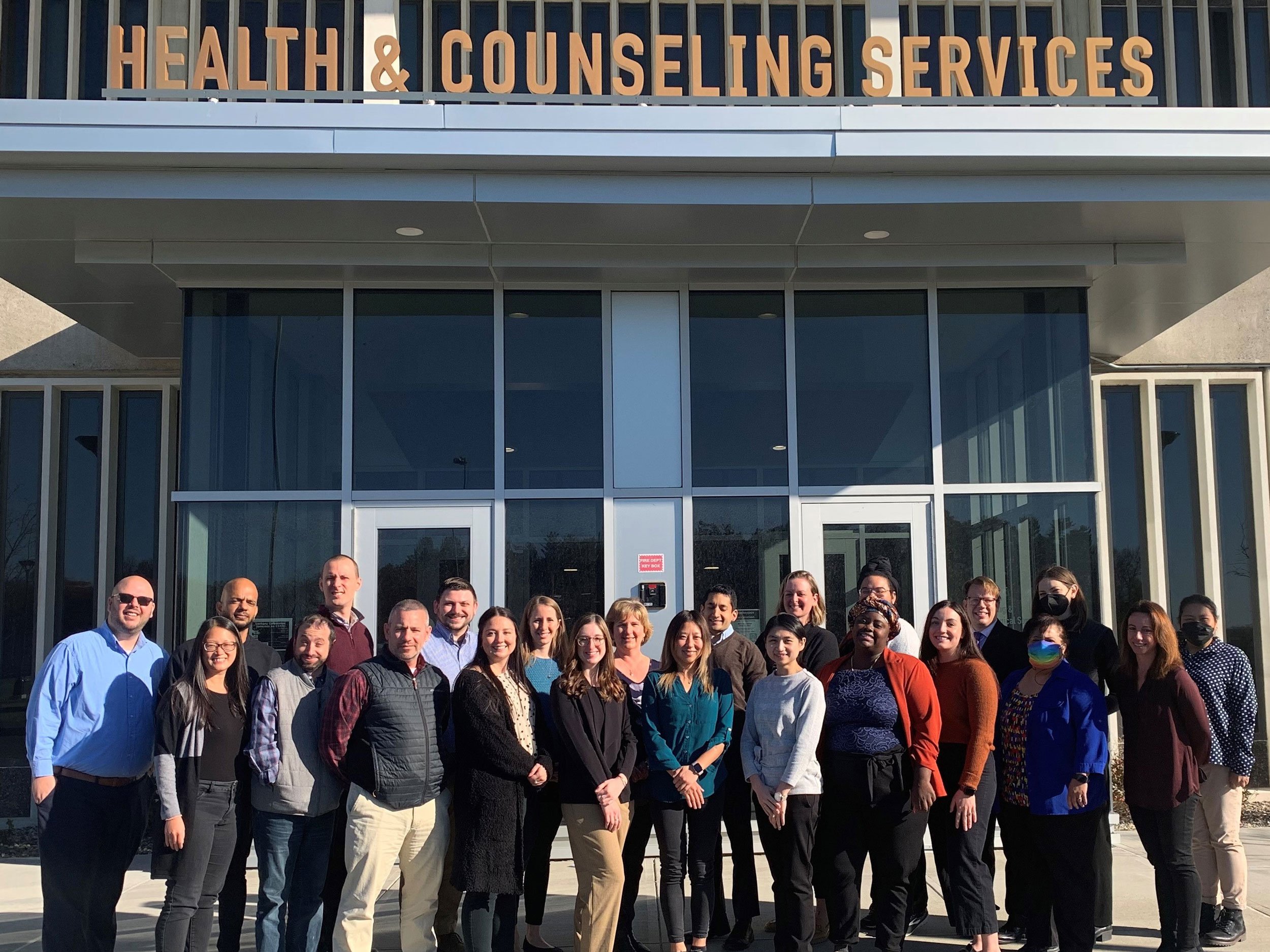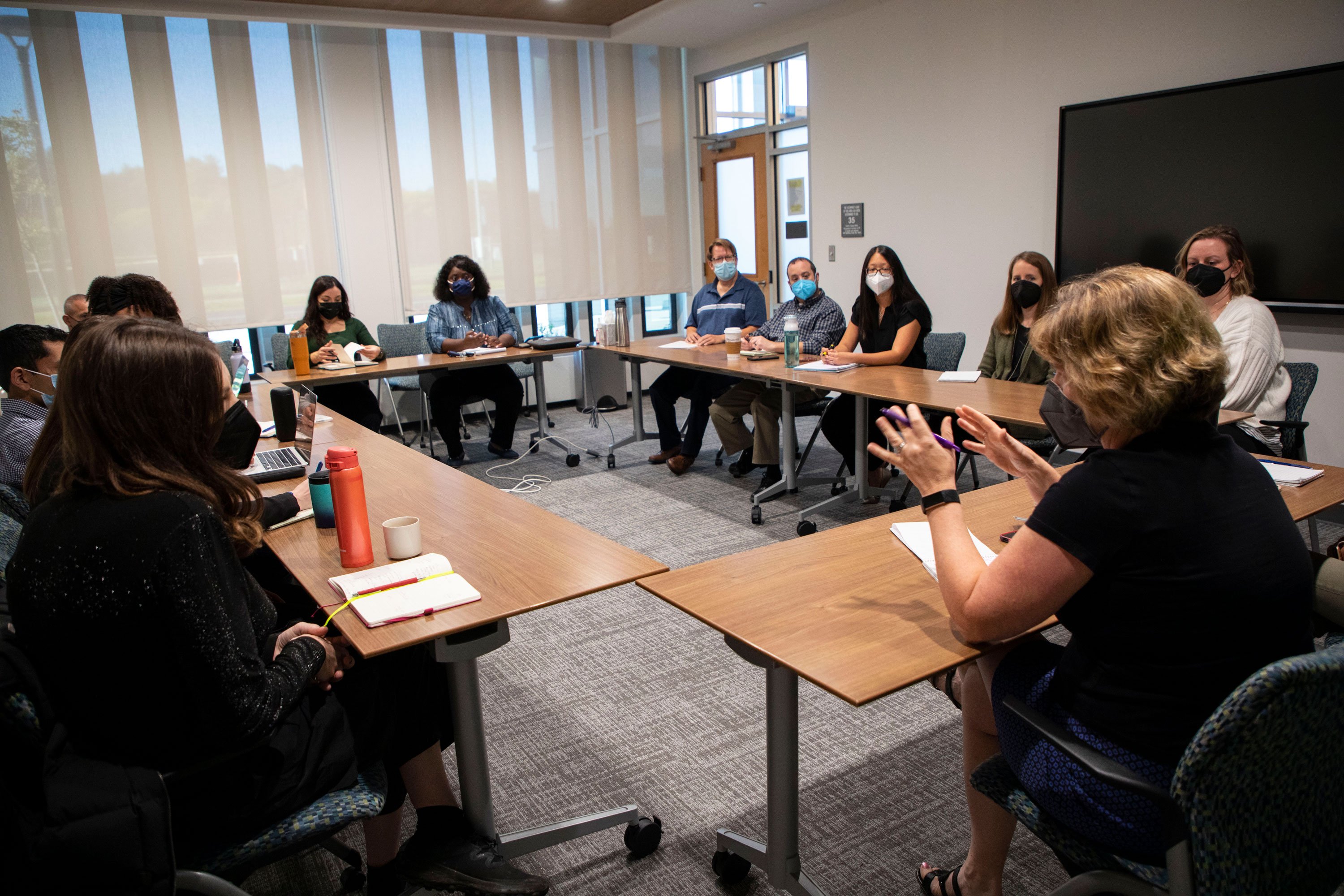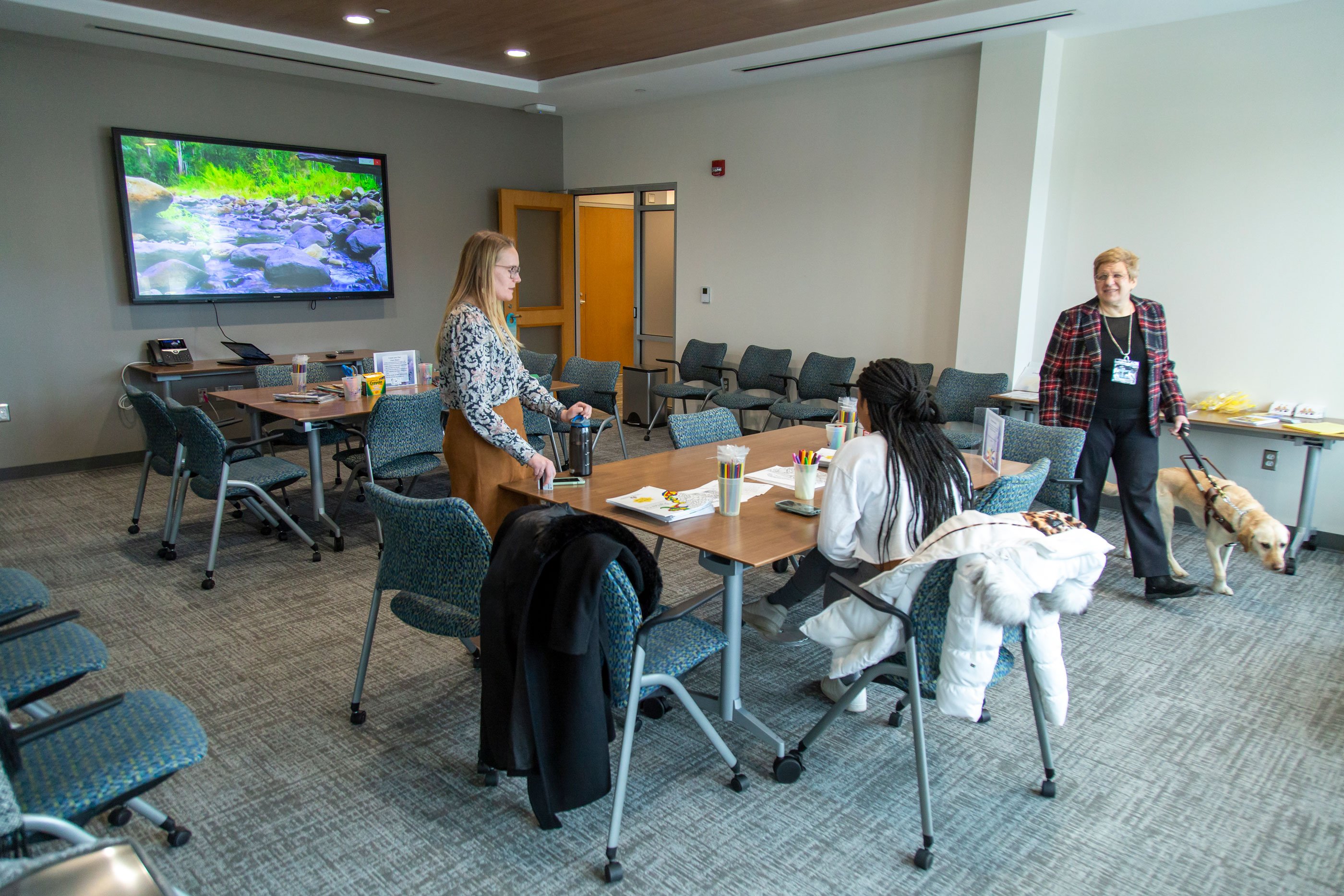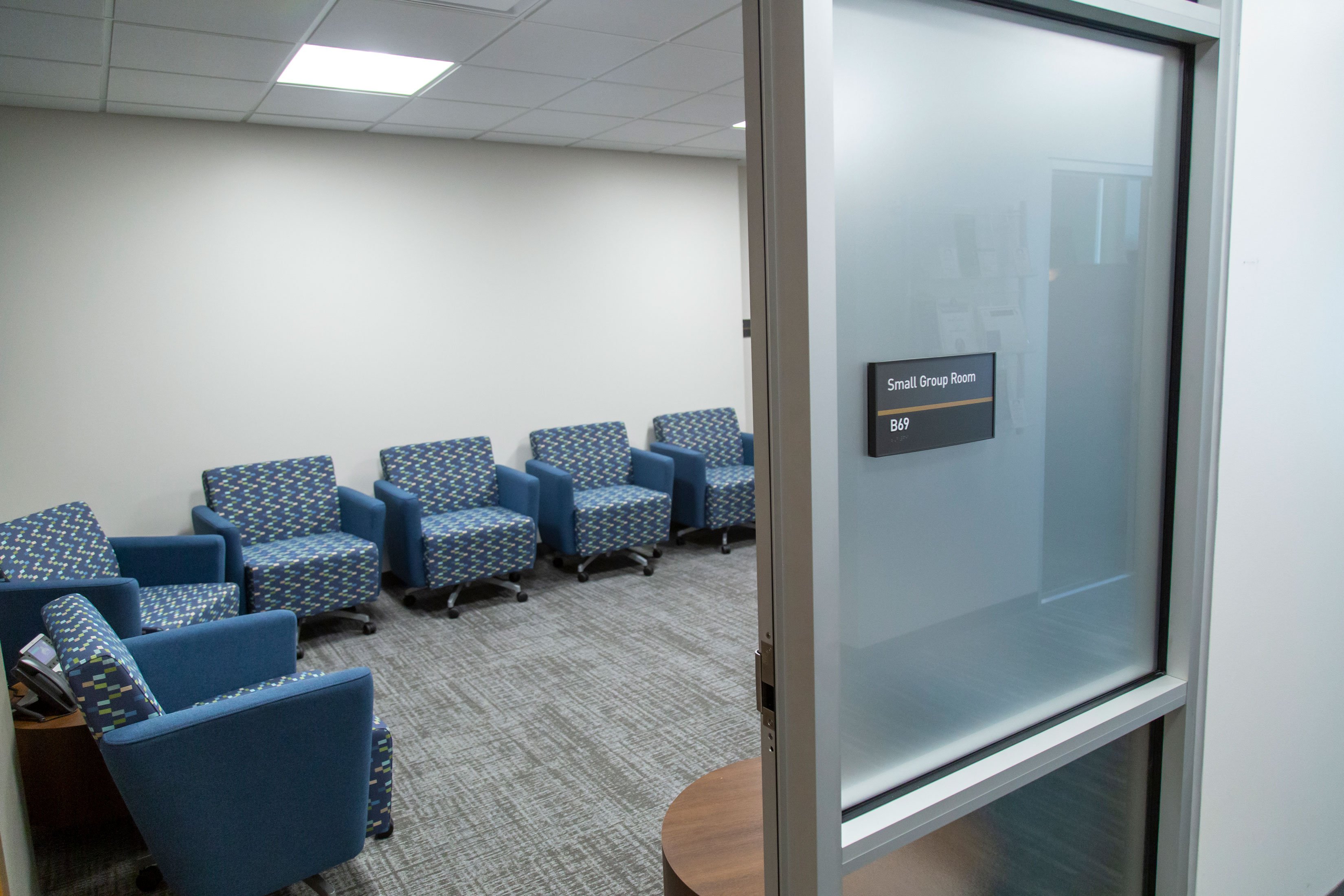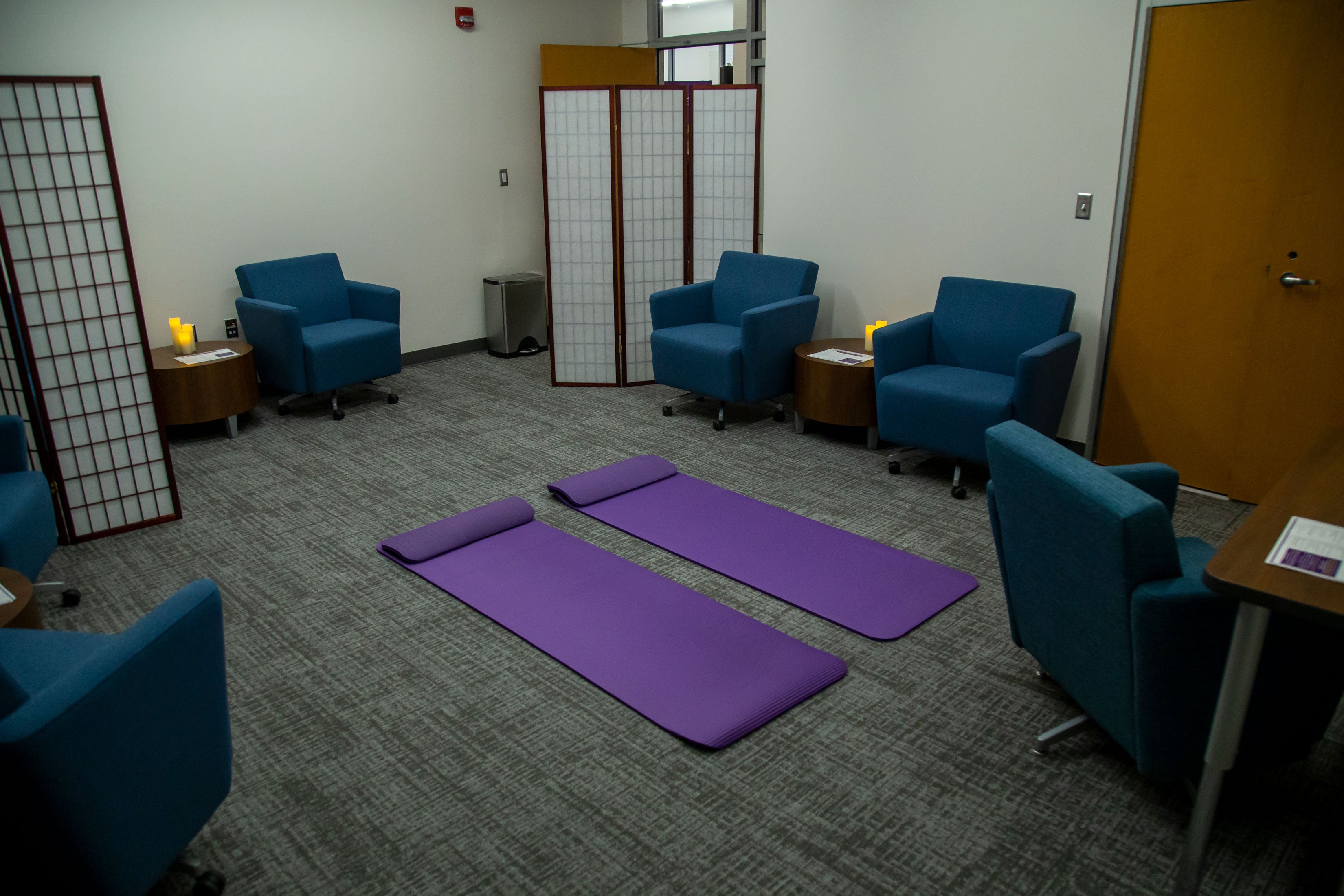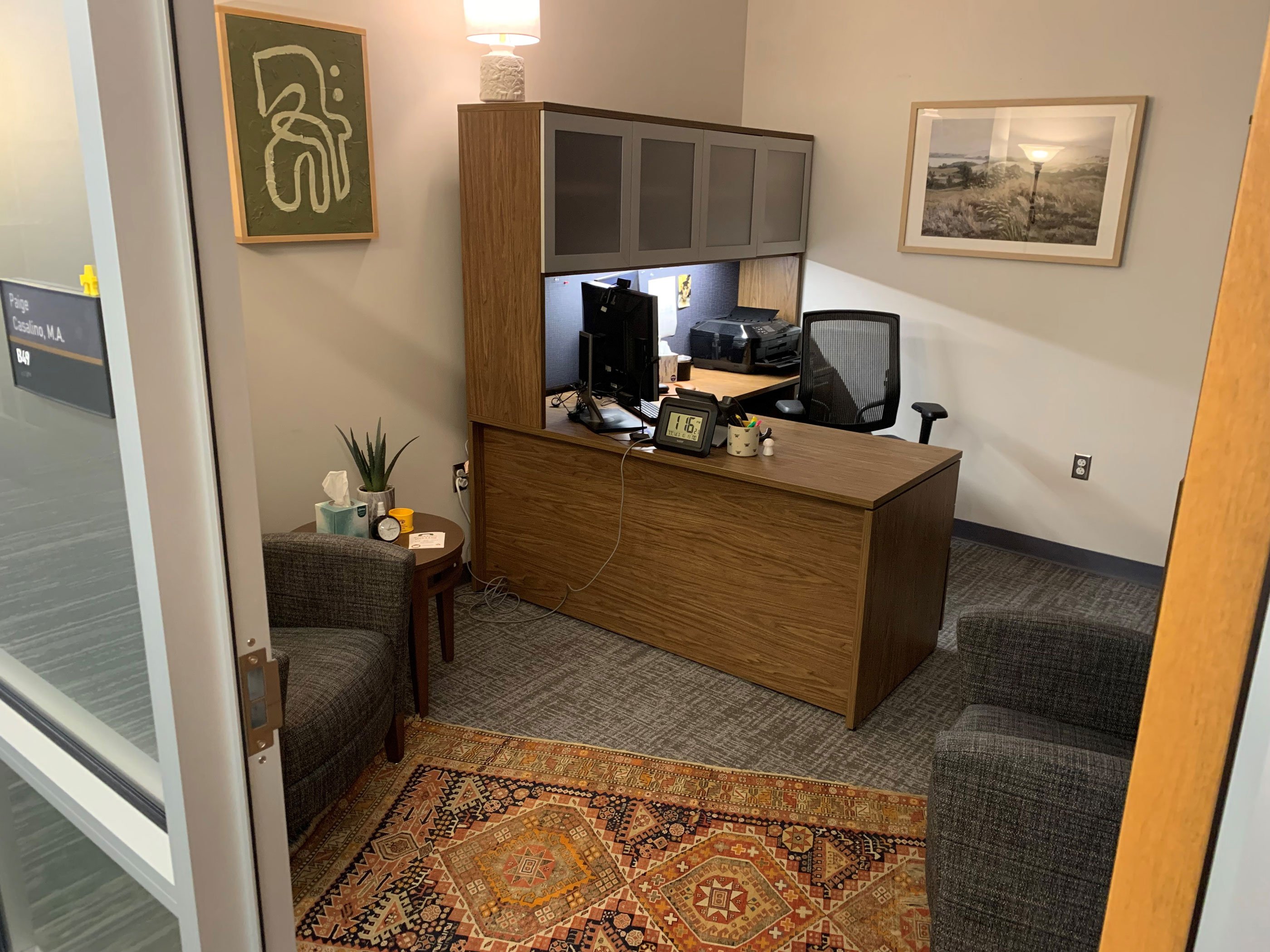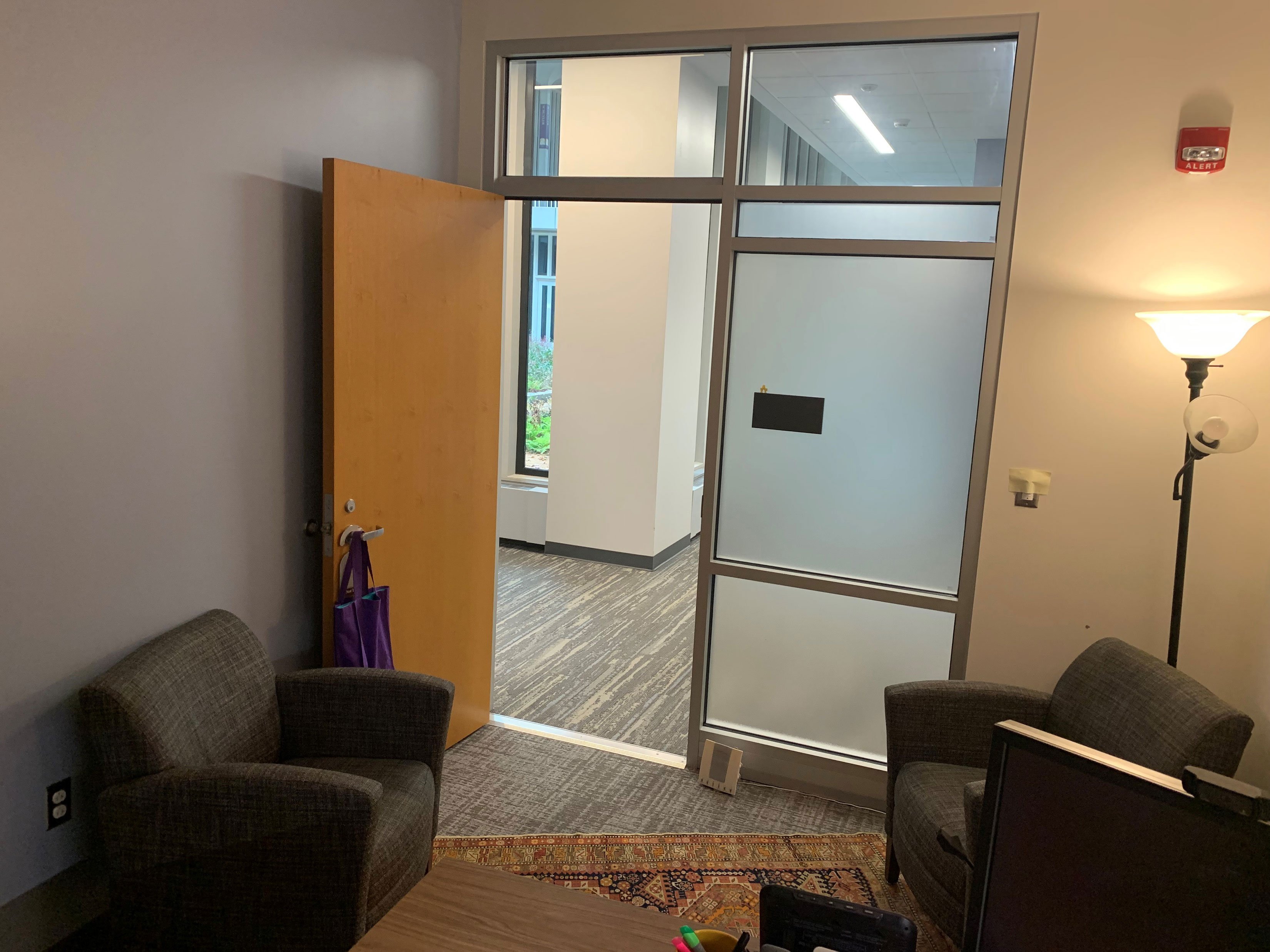Overview
The University at Albany’s health and well-being units offer training programs, internships, graduate assistantships and practicums for students of various backgrounds, which we invite you to explore.
Counseling & Psychological Services (CAPS) provides exceptional training experiences to prepare the next generation of psychologists. CAPS programs include:
Additionally, the Office of Health Promotion works with the College of Integrated Health Sciences to offer internships to Health Sciences students. Visit the Health Sciences Internships page for more information.
CAPS Photo Tour
Our space is bright, modern and spacious. Take a photo tour of our clinic below.
Doctoral Internship in Health Service Psychology
CAPS offers three year-long, full-time doctoral internships in health service psychology each year. Our APA-accredited doctoral internship program is an integral, essential part of our work and mission, with our entire staff involved in training and supporting our trainees.
The goal of this internship program is to develop psychologists who are not only prepared to enter the field of health service psychology and serve a diverse public but who are also competent, professional, ethical and culturally sensitive.
We are particularly committed to promoting diversity awareness and multicultural competence, integrating these principles into every aspect of training — including supervision, seminars, professional activities, evaluations and the overall culture of the center.
Our interns gain supervised experiences in a wide range of activities, including assessment, counseling, consultation, supervision, teaching and program development.
They also receive training in prevention, early intervention and psychological treatment through diverse experiences, training seminars, individual and group supervision, and observational learning opportunities.
Even better? Albany has been named one of the best places to live in the country by U.S. News and World Report. Learn about life at UAlbany.
Please contact Dr. Vivian Wilson-Hwang ([email protected]) with any questions.
Application & Interview Process
CAPS participates in the Association of Psychology Postdoctoral and Internship Centers (APPIC)’s Internship Matching Program. Our Match Code is 166312.
Please visit the APPIC Internship Matching Program website to access the application, as well as instructions, a directory of participating internship sites and other important information.
CAPS agrees to abide by the APPIC policy that no person at this training facility will solicit, accept, or use any ranking-related information from any intern applicant.
Our training committee — comprised of the director of training, several CAPS staff members and typically one current intern — selects interns.
Following the November application deadline, the committee reviews materials and selects applicants for interviews.
Applicants selected for interviews will have two 30-minute interviews in December:
- The first interview will be with two staff members and one undergraduate student involved in the Middle Earth Peer Assistance Program, a peer education group supervised by our staff and interns.
- The second interview will be with the CAPS Training Director.
In January, we offer an optional virtual Open House so applicants can visit our site and meet our staff. This opportunity is optional because we know there are financial and other barriers for many applicants.
Our notification process follows the APPIC Internship Matching Program’s guidelines.
The APPIC Match is conducted in two phases, with each phase involving the submission of ranked lists by programs and applicants to determine the placement of applicants into positions.
Accreditation
This internship program is accredited by the American Psychological Association. The next site visit is designated for 2029.
Questions related to the program's accredited status should be directed to the Commission on Accreditation at the following address:
Office of Program Consultation and Accreditation
American Psychological Association
750 1st Street, NE
Washington, DC 20002-4242
202-336-5979
[email protected]
The doctoral internship program in health service psychology is a member of the Association of Psychology Postdoctoral and Internship Centers (APPIC) and adheres to the standards, policies, and procedures required of member programs. APPIC Program Code: 166312.
Training Philosophy
This internship training program is designed to provide professional training experiences in a range of activities carried out by health service psychologists.
We adhere to a model in which the work of a psychologist is performed within the context of scientific evidence and, as such, interns working at CAPS are immersed in a data informed practice setting.
Throughout the internship, there is an emphasis on:
-
Maintaining a scholarly attitude (questioning, searching for answers, using sound investigative methods and critical thinking)
-
Using research to inform the methods you employ to assess and intervene with clients
-
The value of critically evaluating your practices
We take a developmental and individualized approach to training, recognizing that interns have varied interests, experiences and needs. We also recognize the effect of individual and cultural differences on all of us, as professionals and people.
We are committed to promoting awareness of diversity and multicultural issues, and to training psychologists who provide culturally competent services — accomplishing this goal by integrating these issues into all aspects of training.
Lastly, we believe the internship year is a critical year of professional development, as well as identity transition and formation. Our role is to facilitate that process through instruction, experiential training and supervision.
Program of Training
- Individual Counseling: Interns carry an individual caseload of 10 to 12 client hours per week throughout the year, with both short-term and long-term psychotherapy clients. Interns also provide brief screening and interventions for alcohol and other drug use.
- Assessment: Interns are included in the weekly intake assessment rotation and are involved in non-routine psychological testing, as appropriate.
- Consultation: During the second semester, after months of experience within the University, interns participate in the rotation of staff psychologists who respond to urgent and non-urgent requests for assistance from students, parents, families, faculty, staff and others. This offers interns excellent opportunities to develop consultation skills.
- Groups: Interns interested in co-facilitating a support or therapy group with senior staff psychologists may be able to do so, depending upon interest and time constraints.
- Supervision & Teaching: Interns have the unique opportunity to supervise and teach undergraduate peer educators and peer hotline workers. Interns teach semester-long courses within UAlbany’s nationally recognized Middle Earth Peer Assistance Program. Teaching responsibilities include didactic instruction and group supervision of students volunteering on the hotline. CAPS staff offer supervision of all these activities.
- Crisis Intervention & On-call: Interns share responsibilities backing up the Middle Earth Peer Assistance Program’s hotline. This typically requires being on-call one evening per week and three to four weekends during the fall and spring semesters, while classes are in session. CAPS staff offer supervision of all these activities.
- Campus Health Promotion Outreach: Interns join the entire staff in developing and delivering campus outreach programs in health promotion. Interns are especially active in this role during the summer, when they work with new students and their families.
- Individual Supervision (2 hours per week): Interns are assigned to work with two licensed, supervising psychologists for the year. They meet weekly with each supervisor for one hour of individual supervision, primarily around the intern's clinical caseload and prevention-related activities.
- Group Supervision (2 hours per week): Interns meet as a group with two different licensed psychologists for one hour each week. One group supervision hour is focused on general clinical matters and professional issues, and the other is focused on supervision, teaching and program coordination of peer assistants.
- Intern Seminar (1.5 hours per week): Interns participate in weekly seminars and training workshops that cover a variety of topics. There are also standing, regularly scheduled seminars on individual and cultural diversity.
- Case Conference (1 hour per week): All clinical staff meet weekly in small groups for one hour to discuss cases. Interns typically give at least one formal clinical case presentation per semester. They also present on their doctoral research.
- Clinical Staff Conference (1 hour per week): All clinical staff meet weekly for one hour to discuss clinical cases, coordination of care and disposition issues.
- Director of Training Meeting (1 hour per week): Interns meet weekly with the director of training to clarify questions, address problems and discuss any professional development issues.
- Committee Meetings (0.5 hours per week): Interns attend a bi-weekly or monthly, one-hour committee meeting based on their appointment to one of our Quality Assurance Committees (Training, Clinical, Outreach, or Diversity). Committee appointments are based on fit and the intern’s interests.
- Assessment Team Meeting (0.5 hours per week): Interns attend a bi-weekly one-hour meeting to discuss assessment referrals and receive guidance and supervision on assessment cases.
Start & End Dates, Stipend & Benefits
This year-long position begins July 30, 2026 and ends July 29, 2027.
To meet requirements for completing an APA-accredited internship, doctoral interns must engage in a 40-hour work week (on average) that combines provision of psychological services and other learning activities that support the internship experience.
Renumeration for interns is $45,372. All interns also receive a benefits package, including health insurance, paid state holidays, accrued sick leave and annual leave, and the use of UAlbany facilities.
Like all CAPS psychologists, interns are indemnified under New York State Public Officers Law.
Please see the “Internship Admission, Supports & Initial Placement Data” section below for more information.
Professional Competencies & Evaluation
Interns are evaluated in their attainment of nine Profession-wide Competencies (PWCs), which are identified below with the evaluation form used by the CAPS internship program.
We organize the nine PWCs into four clusters, consistent with our aims. For written materials detailing these competencies, please contact our director of training.
Aim: The intern practices within the scope of ethical and legal guidelines, and in accordance with professional standards in all professional services and activities.
Competency 1. Professional Values, Attitudes, and Behaviors: The intern demonstrates behavior and comportment that reflect the values and attitudes of psychology.
Competency 2. Ethical and Legal Standards: The intern demonstrates application of ethical concepts and awareness of legal issues regarding professional activities with individuals, groups and organizations.
Competency 3. Individual and Cultural Diversity: The intern demonstrates awareness, sensitivity and skills in working professionally with diverse individuals, groups and communities, who represent various cultural and personal backgrounds and characteristics defined broadly and consistent with APA policy.
Aim: The intern effectively produces and utilizes research and psychological knowledge in professional activities.
Competency 4. Research: The intern demonstrates appropriate knowledge, skills and attitudes to produce new knowledge, to critically evaluate and use existing knowledge to solve problems, to disseminate research, and to make appropriate use of scientific methods and findings in all professional roles.
Aim: The intern competently engages in a range of assessment and intervention activities with a diverse population that integrates science and practice and is culturally sensitive.
Competency 5. Assessment: The intern demonstrates competence in assessment and diagnosis of problems, capabilities and issues associated with individuals, groups, and/or organizations.
Competency 6. Intervention: The intern demonstrates skill in the use of interventions designed to alleviate suffering and to promote health and well-being of individuals, groups and/or organizations.
Competency 7. Supervision: The intern demonstrates skill in supervision and training in the professional knowledge base of enhancing and monitoring the professional functioning of others.
Aim: The intern effectively practices within a complex system or organization.
Competency 8. Consultation and Interprofessional/Interdisciplinary Skills: The intern demonstrates the ability to provide expert guidance or professional assistance in response to a client’s needs or goals, and to identify and interact with professionals in multiple disciplines.
Competency 9. Communication and Interpersonal Skills: The intern demonstrates the ability to communicate effectively, to interact appropriately and to develop meaningful and helpful relationships in all professional roles.
We use varied sources of information to determine the degree to which the internship training objectives are being met, including but not limited to:
Feedback from supervising psychologists, as well as other agency supervisors and contributors to the training program, such as clerical and administrative support staff, colleagues within the Student Health Services and colleagues within the Division of Student Affairs & Enrollment
Direct observation, either live or electronic, of the intern engaging in professional activities
Formal uniform assessment of clinical skills
Feedback from recipients of professional services
Requests to complete rating forms provided by intern’s academic programs are handled on a case-by-case basis.
Supervisors provide interns with regular oral feedback and scheduled written feedback. Interns are formally provided with feedback and evaluation according to this schedule:
| Type of Evaluation | Timetable | Supervisor Responsible |
|---|---|---|
| Progress Evaluation (Formative) | Five months into internship | Primary supervisor |
| Performance Evaluation (Summative) | 10 months into internship | Primary supervisor |
| Interim Evaluation (Formative) | If needed / as needed | Primary supervisor |
| Certification of Internship Completion (Summative) | 12 months into internship | Director of training |
There are set procedures that allow interns to appeal written evaluations and, if successful, modify written evaluations.
At each point of formal evaluation, the intern’s primary supervisor provides an overall rating for each PWC, using the rating benchmarks outlined in this table:
| Rating | Level | Performance |
|---|---|---|
| 1 | Needs Remedial Work | The intern is not aware of competency areas that are expected to be foundationally in place at this time or exhibits behaviors indicating lack of readiness for the required work that is required. A doctoral intern evaluated at this level will require an immediate remedial plan. |
| 2 | Emerging Competence | The intern has a basic foundation regarding knowledge, awareness and skill domains of the internship program and begins to make progress toward acquiring competence. Although aware of the baseline goals of the internship program, the intern is most comfortable or capable of learning in structured settings, such as supervision or seminars. |
| 3 | Competent | The intern has achieved an intermediate level of competence appropriate to entry-level psychology practice and is actively working to further enhance competence in the knowledge, awareness or skill area being evaluated. The intern is aware of the competency area and can utilize this awareness to inform their work, but they may benefit from moderate assistance through consultation with other professionals. |
| 4 | Highly Competent | The intern has a highly developed competence in the knowledge, awareness or skill being evaluated. This level of competence is characterized by their ability to utilize knowledge, awareness or skill with minimum structured assistance. The intern is aware of their competence, seeks greater learning and understanding of the competence area as a form of ongoing development, and frequently applies the knowledge, awareness or skill to their work. |
| 5 | Consistently Competent | The intern has a strongly established competence in the knowledge, awareness or skill being evaluated. They consistently function in this competency area at a level that could allow them to work independently. |
| N/A | N/A | Not applicable or assessed. |
The minimum required achievement level for each PWC is different at the internship’s mid-point than at its conclusion.
- Midpoint: To successfully complete the internship, interns must meet an overall rating of two on each PWC at the 10-month Performance Evaluation and continue to meet performance standards until the completion of the internship year.
- Conclusion: To successfully complete the internship, interns must meet an overall rating of three on each PWC at the 12-month Certification of Internship Completion.
Interns who successfully complete the internship are awarded a certificate of completion.
Internship Admission, Supports & Initial Placement Data
Note: Accessible data is posted at the end of this section.
As articulated in Standard I.B.2, programs may have “admission and employment policies that directly relate to affiliation or purpose” that may be faith-based or secular in nature. However, such policies and practices must be disclosed to the public. Therefore, programs are asked to respond to the following question.
Does the program or institution require students, trainees, and/or staff (faculty) to comply with specific policies or practices related to the institution’s affiliation or purpose? Such policies or practices may include, but are not limited to, admissions, hiring, retention policies, and/or requirements for completion that express mission and values. | ___ Yes _X_ No |
If yes, provide website link (or content from brochure) where this specific information is presented: N/A | |
Briefly describe in narrative form important information to assist potential applicants in assessing their likely fit with your program. This description must be consistent with the |
This is a yearlong, fulltime, remunerated internship experience (2,000 hours) that begins on July 30, 2026 and concludes on July 29, 2027. In order to meet the requirements interns must engage in a forty hour week (average) that combines the provision of psychological services under supervision and other learning activities that support the internship experience. |
Does the program require that applicants have received a minimum number of hours of the following at time of application? If Yes, indicate how many: |
Total Direct Contact Intervention Hours: Yes; 450 Hours Total Direct Contact Assessment Hours: No |
Describe any other required minimum criteria used to screen applicants: |
Comprehensive Exams Passed: By application deadline |
Annual Stipend/Salary for Full-time Interns | $45,372 | |
Annual Stipend/Salary for Half-time Interns | N/A | |
Program provides access to medical insurance for intern? | Yes | N/A |
Trainee contribution to cost for medical insurance required? | Yes | N/A |
Medical insurance coverage of family member(s) available? | Yes | N/A |
Medical insurance coverage of legally married partner available? | Yes | N/A |
Medical insurance coverage of domestic partner available? | Yes | N/A |
Hours of Annual Paid Personal Time Off (PTO and/or Vacation) | Accrued 1.25 days/month | |
Hours of Annual Paid Sick Leave | Accrued 1.25 days/month | |
In the event of medical conditions and/or family needs that require extended leave, does the program allow reasonable unpaid leave to interns/residents in excess of personal time off and sick leave? | Yes | N/A |
Aggregated Tally for the Preceding 3 Cohorts
| 2022-2025 | |
Total # of interns who were in the 3 cohorts | 9 | |
Total # of interns who did not seek employment because they returned to their doctoral program/are completing doctoral degree | 0 | |
| PD | EP |
Community mental health | N/A | N/A |
Federally qualified health center | N/A | N/A |
Independent primary care facility/clinic | N/A | N/A |
University counseling center | 5 | 1 |
Veterans Affairs medical center | N/A | N/A |
Military health center | N/A | N/A |
Academic health center | N/A | N/A |
Other medical center or hospital | N/A | N/A |
Psychiatric hospital | 1 | N/A |
Academic/university department | N/A | N/A |
Community college or other teaching setting | N/A | N/A |
Independent research institution | N/A | N/A |
Correctional facility | N/A | N/A |
School district/system | N/A | N/A |
Independent practice setting | 1 | 1 |
Not currently employed | N/A | N/A |
Changed to another field | N/A | N/A |
Other | N/A | N/A |
Unknown | N/A | |
Note: “PD” = Post-doctoral residency position; “EP” = Employed Position. Each individual represented in this table should be counted only one time. For former trainees working in more than one setting, select the setting that represents their primary position.
Accessible Data
Program Disclosures:
As articulated in Standard I.B.2, programs may have “admission and employment policies that directly relate to affiliation or purpose” that may be faith-based or secular in nature. However, such policies and practices must be disclosed to the public. Therefore, programs are asked to respond to the following question.
Question: Does the program or institution require students, trainees, and/or staff (faculty) to comply with specific policies or practices related to the institution’s affiliation or purpose? Such policies or practices may include, but are not limited to, admissions, hiring, retention policies, and/or requirements for completion that express mission and values.
Answer: No.
Internship Program Admissions:
Briefly describe in narrative form important information to assist potential applicants in assessing their likely fit with your program. This description must be consistent with the program’s policies on intern selection and practicum and academic preparation requirements:
This is a yearlong, full-time, remunerated internship experience (2,000 hours) that begins on July 30, 2026 and concludes on July 29, 2027. In order to meet the requirements interns must engage in a forty hour week (average) that combines the provision of psychological services under supervision and other learning activities that support the internship experience.
Does the program require that applicants have received a minimum number of hours of the following at time of application? If Yes, indicate how many:
Total Direct Contact Intervention Hours: Yes; 450 Hours
Total Direct Contact Assessment Hours: No
Describe any other required minimum criteria used to screen applicants:
Comprehensive Exams Passed: By application deadline
Dissertation Proposal Approved: By ranking deadline
Number of Years of Graduate Training: 3
APA or CPA Accredited: Required
Financial and Other Benefit Supports for Upcoming Training Year
Annual Stipend/Salary for Full-time Interns: $45,372
Annual Stipend/Salary for Half-time Interns: N/A
Program provides access to medical insurance for intern: Yes
Trainee contribution to cost for medical insurance required: Yes
Medical insurance coverage of family member(s) available: Yes
Medical insurance coverage of legally married partner available: Yes
Medical insurance coverage of domestic partner available: Yes
Hours of Annual Paid Personal Time Off (PTO and/or Vacation): Accrued 1.25 days per month
Hours of Annual Paid Sick Leave: Accrued 1.25 days per month
In the event of medical conditions and/or family needs that require extended leave, does the program allow reasonable unpaid leave to interns/residents in excess of personal time off and sick leave: Yes
Initial Post-Internship Positions
The following is an aggregated tally for the preceding three cohorts (2021 to 2023).
Total number of interns in the past three cohorts: 9
Total number of interns who did not seek employment because they returned to their doctoral program/are completing doctoral degree: Zero
Each individual represented in the table below is counted only one time. Trainees working in more than one setting are represented in their primary position.
Position | Trainees in a Post-doctoral Residency Position | Trainees in an Employed Position |
|---|---|---|
Community mental health | 0 | 0 |
Federally qualified health center | 0 | 0 |
Independent primary care facility/clinic | 0 | 0 |
University counseling center | 5 | 1 |
Veterans Affairs medical center | 0 | 0 |
Military health center | 0 | 0 |
Academic health center | 0 | 0 |
Other medical center or hospital | 0 | 0 |
Psychiatric hospital | 1 | 0 |
Academic or university department | 0 | 0 |
Community college or other teaching setting | 0 | 0 |
Independent research institution | 0 | 0 |
Correctional facility | 0 | 0 |
School district or system | 0 | 0 |
Independent practice setting | 1 | 1 |
Not currently employed | 0 | 0 |
Changed to another field | 0 | 0 |
Other | 0 | 0 |
Unknown | 0 | 0 |
Advanced Psychology Practicum
CAPS provides advanced practicum training opportunities for students enrolled in UAlbany’s:
- Master of Social Work (MSW) program
- Clinical Psychology doctoral program
- Counseling Psychology doctoral program
Students work 12 to 16 hours per week, from September to May.
To apply, please email your CV and a cover letter to Dr. Erin Cannella ([email protected]). You may also contact Erin with any questions.
Master’s students must apply by the end of the School of Social Welfare’s Field Placement Fair in February. Doctoral students must apply by April 1.



